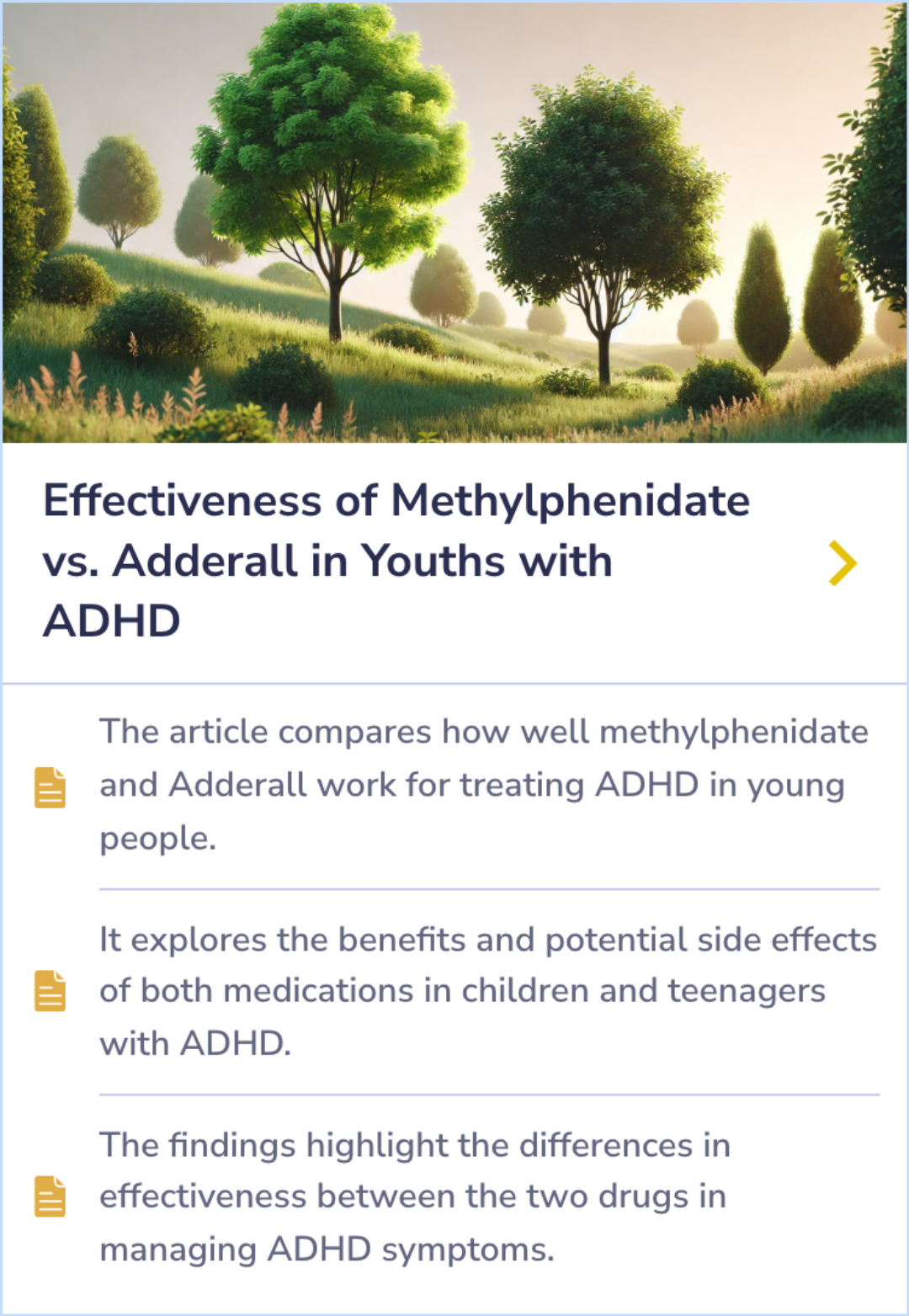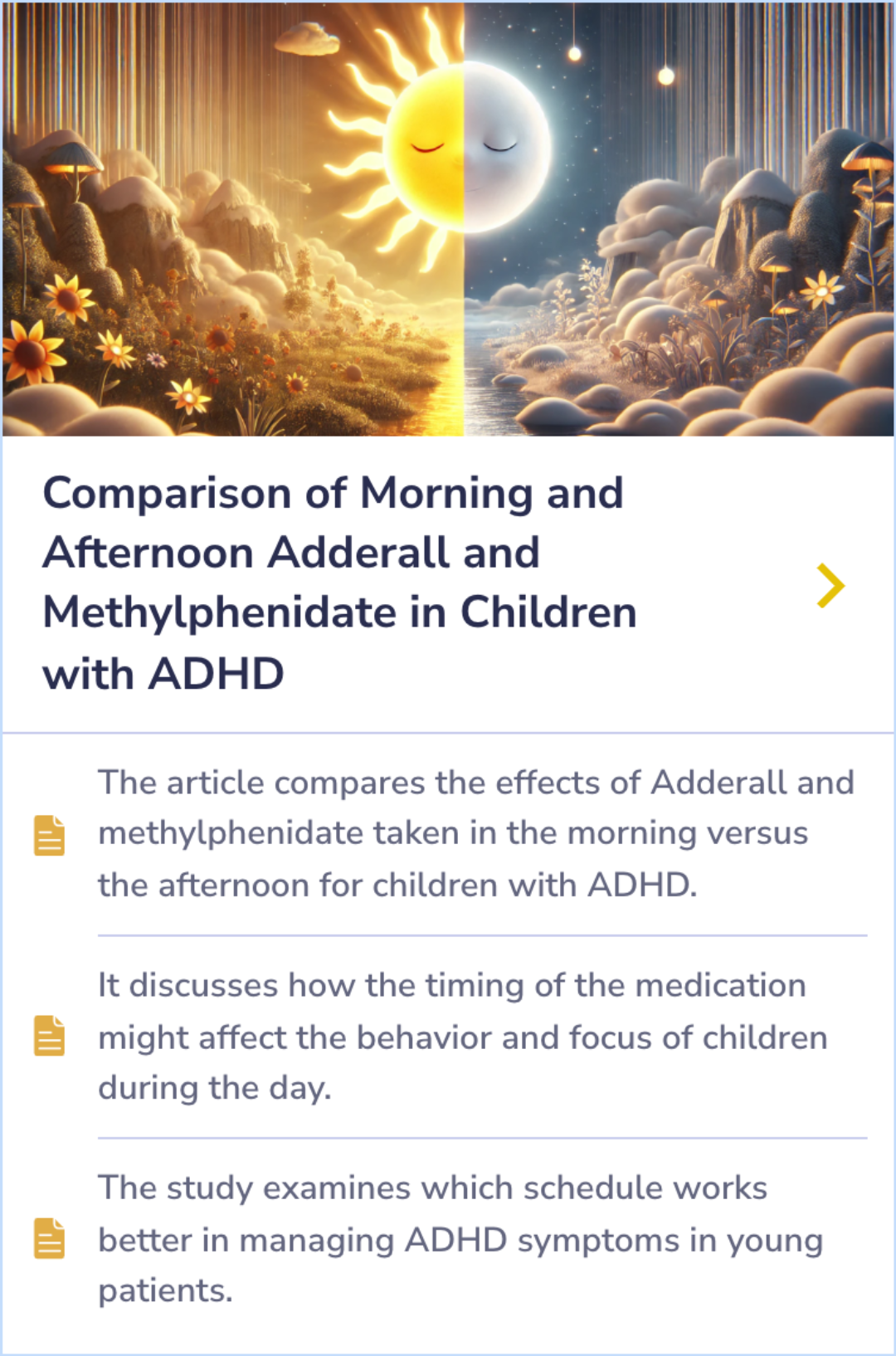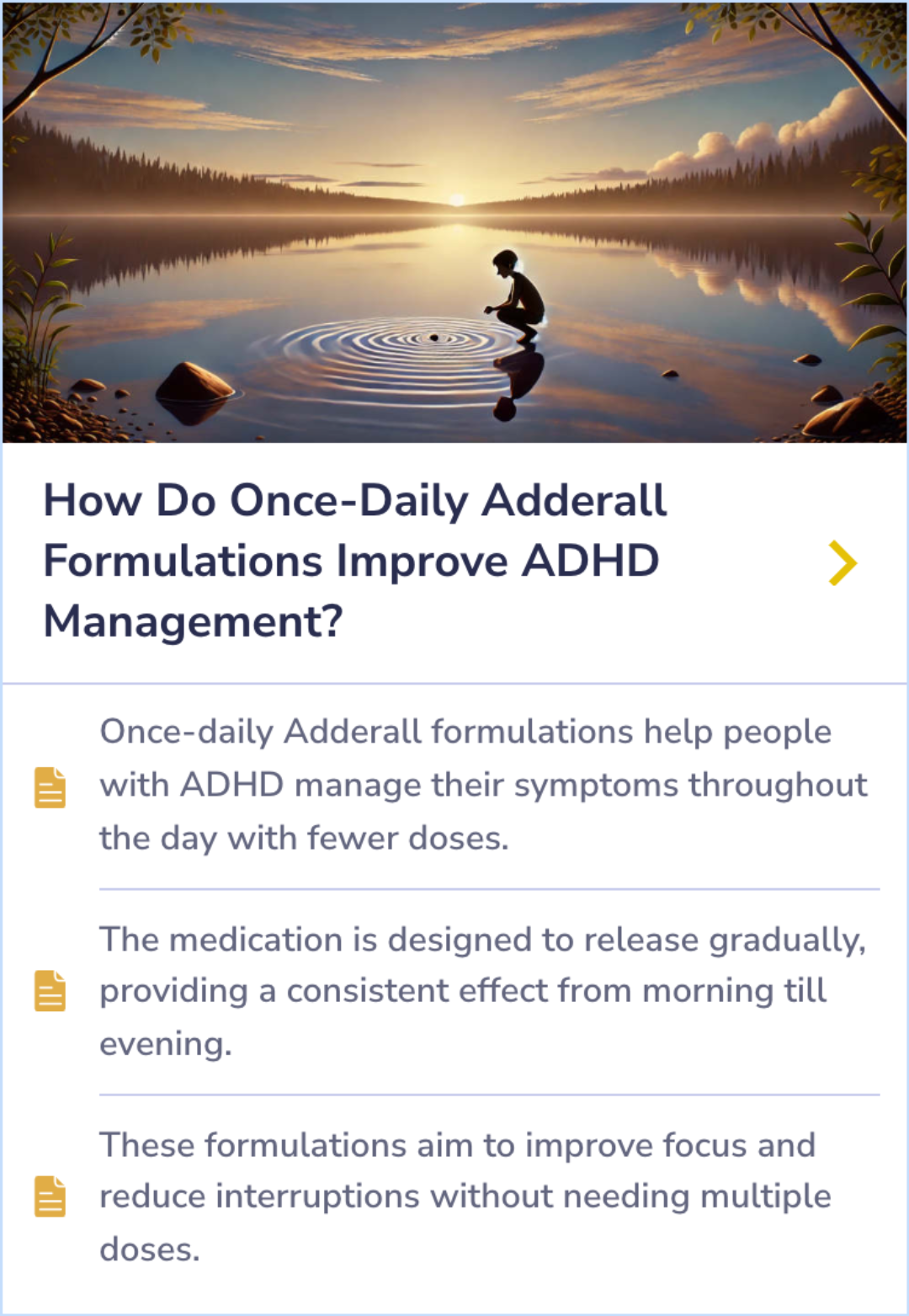ADHD Drug Comparisons
Evidence Based Comparison
Adderall (Amphetamines) vs Ritalin (Methylphenidate): Efficacy in Children
Published: November 12, 2024
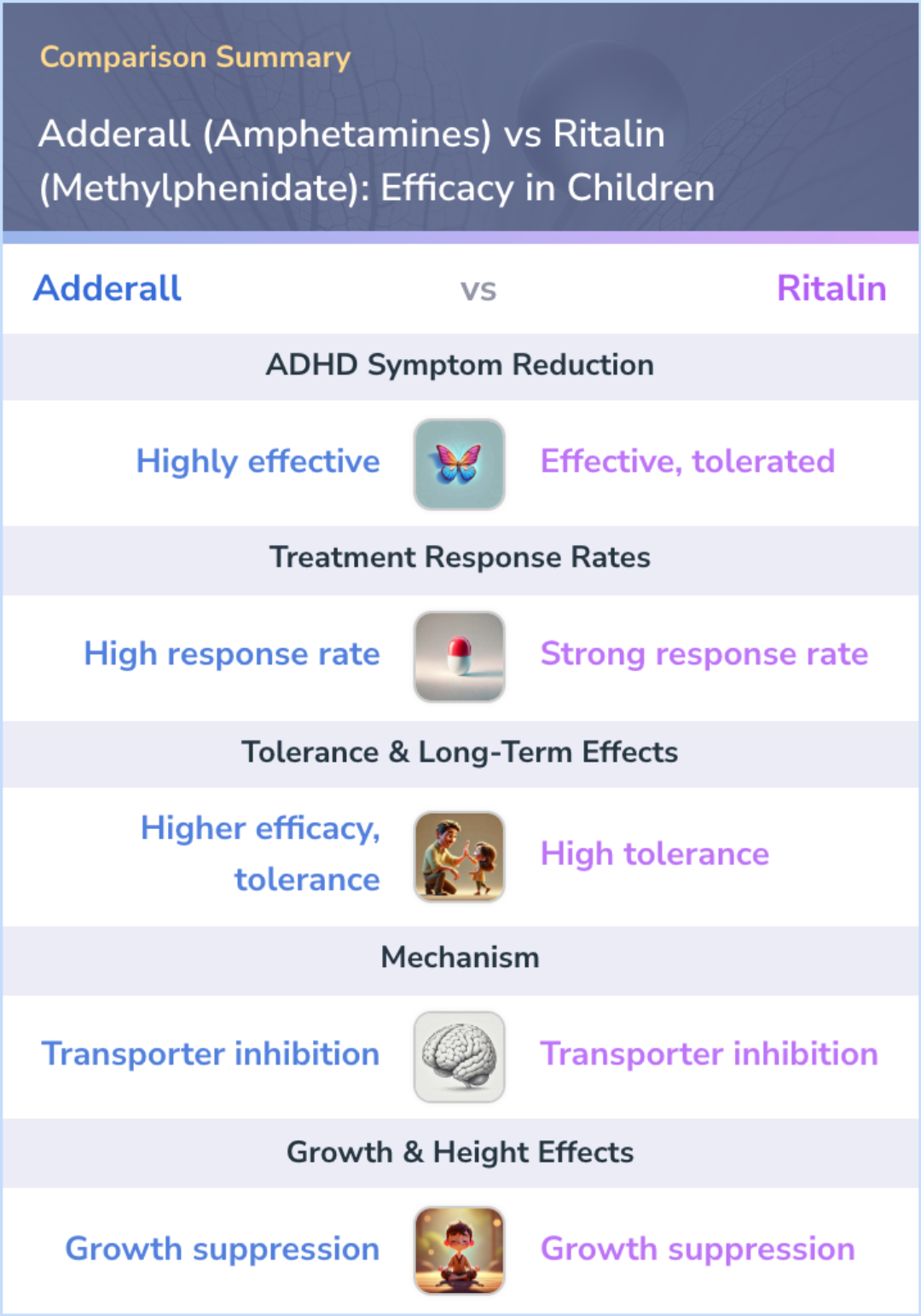
Summary
⚖️
Reducing ADHD Symptoms Effectively
Adderall may slightly outperform Ritalin for reducing ADHD symptoms, but Ritalin is often better tolerated.
📊
High Response Rates for ADHD Treatment
Both Adderall and Ritalin show high response rates in children, though individual responses vary.
⏳
Long-Term Tolerance and Management
Ritalin tends to be better tolerated than Adderall over long-term use, affecting adherence.
Comparison
Effectiveness in Reducing Core ADHD Symptoms
Adderall and Ritalin both reduce core ADHD symptoms effectively. Studies suggest amphetamines may have slightly greater effects in symptom reduction, while methylphenidate is better tolerated by some patients.
Adderall
"In a systematic review and meta-analysis that included 81 published and unpublished randomized trials in >10,000 children, amphetamines were slightly more efficacious than methylphenidate in reducing clinician-rated core symptoms of ADHD at approximately 12 weeks."
UptoDate: ADHD Treatment in ChildrenRitalin
"Although amphetamines may be slightly more efficacious, methylphenidate is better tolerated."
UptoDate: ADHD Treatment in Children
⭐️ flashcard
ADHD Symptom Reduction
Adderall is highly effective for ADHD symptom reduction in children.
Ritalin is effective in reducing ADHD symptoms but is better tolerated.
Comparison
Response Rate to Treatment
Adderall and Ritalin generally show high response rates in children with ADHD when systematically administered. Individual responses may vary and require careful monitoring by caregivers and healthcare professionals.
Adderall
"The response rate to a specific stimulant (ie, reduction in hyperactivity or increase in attention as rated by caregivers, teachers, and/or research raters) is approximately 70 percent."
UptoDate: ADHD Treatment in ChildrenRitalin
"At least 80 percent of school-aged children and adolescents will demonstrate a response in core symptoms with stimulants if the stimulants are tried in a systematic way."
UptoDate: ADHD Treatment in Children
⭐️ flashcard
Treatment Response Rates
Adderall shows a high response rate in systematic use for children.
Ritalin shows strong response rates when systematically tried.
Comparison
Tolerance and Long-Term Use
While Adderall may offer slightly more efficacy in reducing ADHD symptoms, Ritalin tends to be better tolerated over long-term use, which can impact adherence and management strategies.
Adderall
"Although amphetamines may be slightly more efficacious, methylphenidate is better tolerated."
UptoDate: ADHD Treatment in Children
⭐️ flashcard
Tolerance & Long-Term Effects
Adderall may offer slightly higher efficacy but with tolerance issues.
Ritalin offers high tolerance and manageable long-term use.
Comparison
Mechanism of Action Differences
Adderall and Ritalin both increase dopamine and norepinephrine, but their mechanisms vary. This can influence response, side effects, and comorbidities in ADHD treatment.
Adderall
"Amphetamine actions include dopamine and norepinephrine transporter inhibition, vesicular monoamine transporter 2 (VMAT-2) inhibition, and monoamine oxidase activity inhibition."
The pharmacology of amphetamine and methylphenidateRitalin
"Methylphenidate actions include dopamine and norepinephrine transporter inhibition, agonist activity at the serotonin type 1A receptor, and redistribution of the VMAT-2."
The pharmacology of amphetamine and methylphenidate
⭐️ flashcard
Mechanism
Adderall inhibits transporter and increases monoamine release.
Ritalin inhibits dopamine and norepinephrine transporter.
Comparison
Growth Suppression Concerns
Growth suppression is a concern for both Adderall and Ritalin, though Ritalin may have a more established association with decreased height and weight in children.
Adderall
"Your child's doctor will watch his or her growth carefully. Talk to your child's doctor if you have concerns about your child's growth or weight gain while he or she is taking this medication."
MedlinePlus: Adderall, amphetaminesRitalin
"In children, it is essential to evaluate their growth curve for a stable progression in height, and weight since methylphenidate has demonstrated growth suppression when used daily, long-term."
StatPearls: Methylphenidate
⭐️ flashcard
Growth & Height Effects
Adderall requires growth monitoring in children.
Ritalin has a documented association with growth suppression.
Peer Reviewed Study
Study: Comparing Adderall and Ritalin for ADHD in Children
Adderall showed greater efficacy than a low dose of Ritalin during periods when Ritalin's effects typically diminished.
Both medications significantly improved behavior and academic productivity compared to placebo, though Adderall exhibited a longer-lasting impact.
Both medications significantly improved behavior and academic productivity compared to placebo, though Adderall exhibited a longer-lasting impact.
Adderall
Adderall was more effective during midday and late afternoon when Ritalin's effects subsided.
Ritalin
Ritalin provided improvement but with shorter-lasting effects.
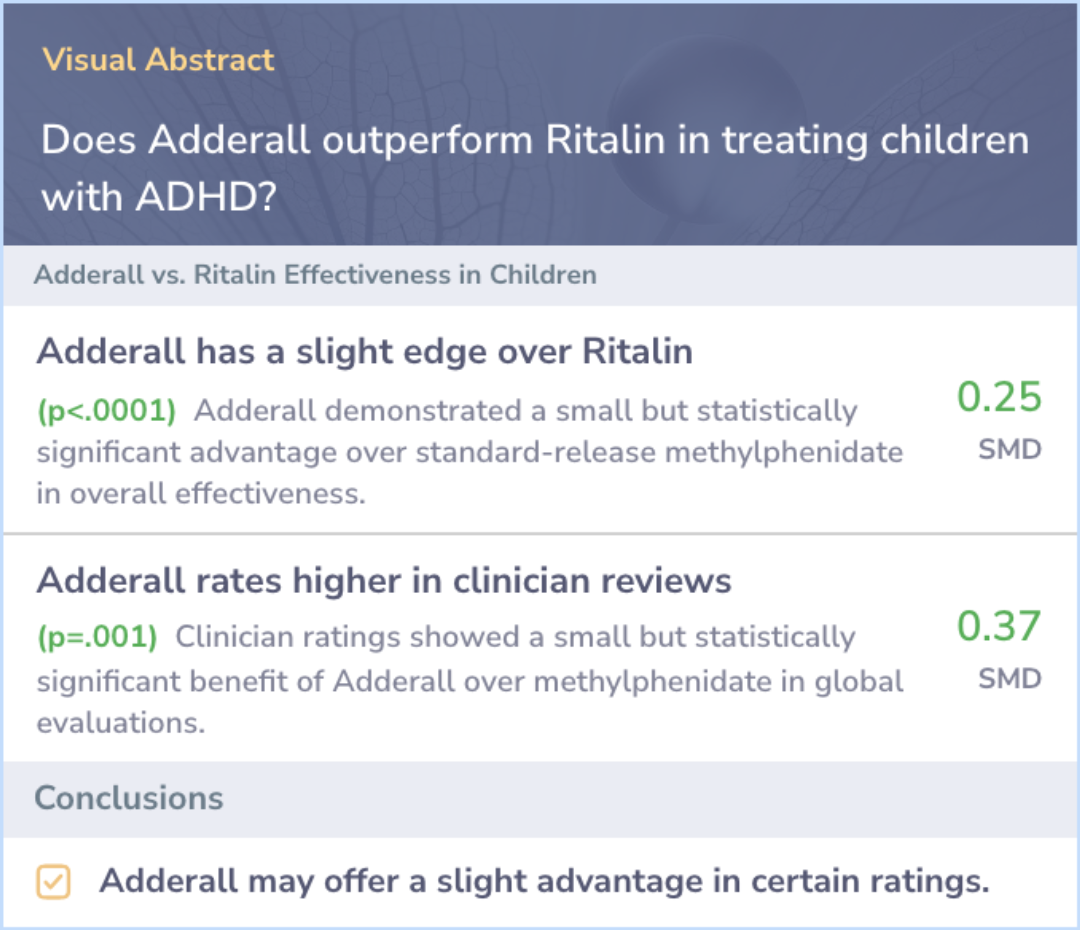
Peer Reviewed Study
Study: Adderall vs. Ritalin: School-Day Efficacy
This study compares single-dose morning Adderall with twice-daily Ritalin (MPH). Adderall maintained behavior throughout the school day, while single-dose Ritalin wore off earlier. Both drugs were significantly more effective than placebo, with Adderall showing a stronger effect than once-daily Ritalin.
These findings highlight Adderall's potential as a long-acting stimulant for children needing consistent daily control without midday dosing.
These findings highlight Adderall's potential as a long-acting stimulant for children needing consistent daily control without midday dosing.
Adderall
Adderall maintained effectiveness throughout the day.
Ritalin
Ritalin worn off early when given as a single dose.

Peer Reviewed Study
Studies: Adderall vs. Ritalin for ADHD in Children: Comparative Efficacy
The first abstract highlights a study comparing the effects of Adderall and Ritalin on children with ADHD. It notes that both drugs improved negative behavior and academic productivity compared to a placebo. Adderall showed more sustained effects throughout the day, particularly during the midday and evening, compared to lower doses of Ritalin. Clinicians favored Adderall three to one in their recommendations.
The second abstract references a meta-analysis of studies comparing Adderall and methylphenidate (Ritalin). It found Adderall slightly more effective, especially on global ratings by clinicians and parents, but not consistently with teacher ratings.
The second abstract references a meta-analysis of studies comparing Adderall and methylphenidate (Ritalin). It found Adderall slightly more effective, especially on global ratings by clinicians and parents, but not consistently with teacher ratings.
Adderall
Adderall generally showed more sustained effectiveness, particularly in the afternoon and evening.
Ritalin
Ritalin improved behavior and academic productivity but showed less sustained effects than Adderall.

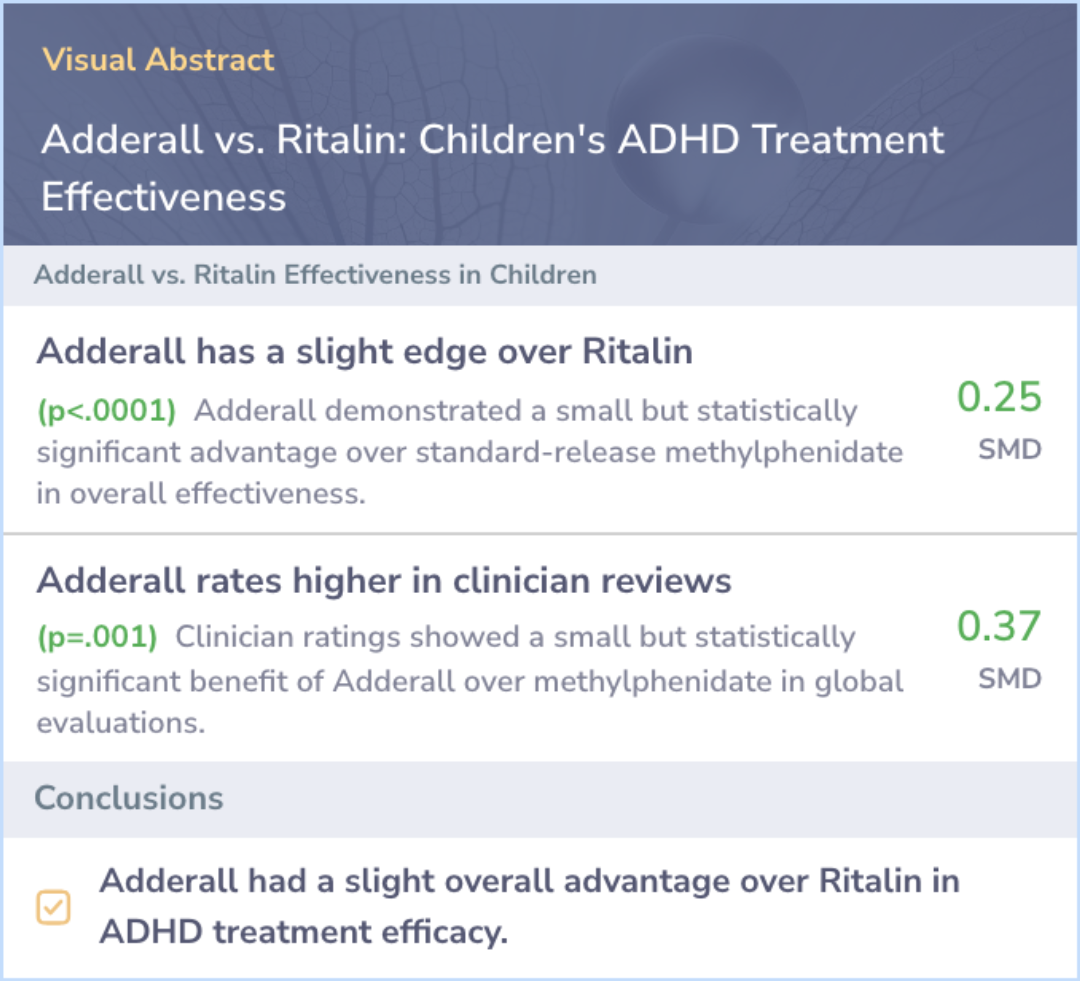
Peer Reviewed Study
Study: Adderall vs. Ritalin in Children with ADHD
Several studies comparing Adderall and Ritalin indicate that Adderall shows a statistically significant, though modest, overall advantage in efficacy.
This advantage is most evident in clinician ratings of global effectiveness, where Adderall outperforms Ritalin.
While both medications offer benefits, these findings suggest Adderall may have a slight edge for specific outcomes.
This advantage is most evident in clinician ratings of global effectiveness, where Adderall outperforms Ritalin.
While both medications offer benefits, these findings suggest Adderall may have a slight edge for specific outcomes.
Adderall
Adderall shows a modest edge in overall and clinician ratings.
Ritalin
Ritalin is effective but showed slightly lower ratings in comparison.

Evidence Summary
Methylphenidate vs. Adderall: ADHD Treatment Comparison
Comparing two widely used ADHD medications, this article sheds light on the differences between methylphenidate and Adderall in treating young people. It examines how each drug manages ADHD symptoms in children and teens, revealing unique aspects of their effectiveness.
The study highlights the benefits and potential side effects associated with each medication, helping distinguish which might suit different patients and treatment goals.
By analyzing both drugs, the study provides a clearer picture of their roles in ADHD management for youth.
The study highlights the benefits and potential side effects associated with each medication, helping distinguish which might suit different patients and treatment goals.
By analyzing both drugs, the study provides a clearer picture of their roles in ADHD management for youth.
Evidence Summary
Timing ADHD Medication: Morning vs. Afternoon Doses
Taking ADHD medications like Adderall or methylphenidate at different times can change how children respond throughout the day. Comparing morning versus afternoon doses, this piece looks at which schedule may better control symptoms, from behavior to focus.
The timing of these doses plays a key role in managing symptoms during school hours, affecting how children behave and concentrate during the day.
Examining dose timing highlights how morning or afternoon administration can impact daily effectiveness.
The timing of these doses plays a key role in managing symptoms during school hours, affecting how children behave and concentrate during the day.
Examining dose timing highlights how morning or afternoon administration can impact daily effectiveness.
Evidence Summary
Consistent Focus with Once-Daily Adderall
Once-daily Adderall formulations offer a steady release of medication, helping individuals with ADHD stay focused without needing multiple doses. By spreading out the release, these formulations support consistent symptom control from morning to evening.
Reducing the need for frequent dosing helps minimize interruptions and enhances overall focus, allowing individuals to better manage their daily tasks and routines.
Reducing the need for frequent dosing helps minimize interruptions and enhances overall focus, allowing individuals to better manage their daily tasks and routines.
